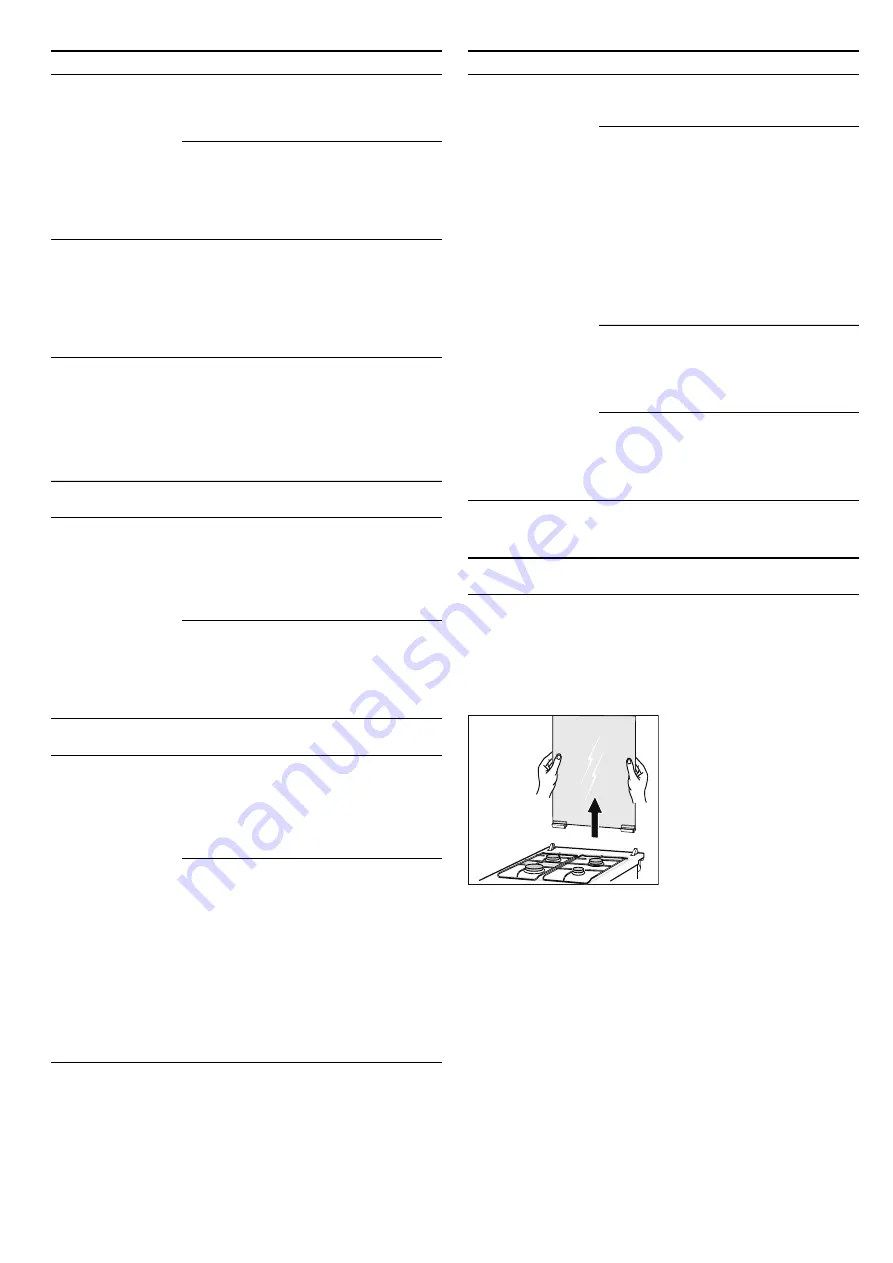
40
Upper glass cover
Before opening the top cover, remove any spills with a cloth.
Use glass cleaner if possible.
For cleaning, remove the top cover. To do this, hold the cover
securely on both sides with both hands and pull it upwards.
If the cover hinges become loose, note the letters marked on
them. The hinge with the letter R must be fitted on the right, and
the hinge with the letter L must be fitted on the left.
After cleaning, re-assemble the top cover following the same
procedure in reverse order.
Only close the top cover once the burners have cooled down.
Glass hob*
(depending on
appliance model)
Care: Protective/care products for glass
Cleaning: Cleaning agents for glass.
Follow the cleaning instructions on the
packaging.
:
Glass scraper for stubborn dirt:
Remove the protective cover and clean
using the blade only. Caution: The blade
is very sharp. Risk of injury.
Cover the blade again after cleaning.
Replace damaged blades immediately.
Glass panel
Glass cleaner:
Clean with a soft cloth.
Do not use the glass scraper.
The door can be removed to facilitate
cleaning. To find out how to do this,
please refer to the section
Removing and
refitting the oven door
.
Childproof lock*
(depending on
appliance model)
Hot soapy water:
Clean with a dish cloth.
If a childproof lock has been fitted to the
oven door, it must be removed before
cleaning.
If it is very dirty, the childproof lock will
not work properly.
Seal
Do not remove.
Hot soapy water:
Clean with a dish cloth. Do not scour.
Cooking zone
Hot soapy water or a vinegar solution:
Clean with a dish cloth.
For stubborn dirt, use a stainless steel
scouring pad or oven cleaner.
Only use when the cooking compartment
is cold.
:
Please use the self-cleaning function
to clean self-cleaning surfaces. To find
out how to do this, please refer to the
section
Self-cleaning
.
Caution! Never use oven cleaner on self-
cleaning surfaces.
Glass cover for the
oven light
Hot soapy water:
Clean with a dish cloth.
Shelf
Hot soapy water:
Clean with a dish cloth or a brush.
You can remove the shelves for cleaning.
To find out how to do this, please refer to
the section
Removing and refitting
shelves
.
Telescoping extension rails*
(depending on appliance model)
Hot soapy water:
Clean with a dish cloth or a brush.
Do not remove the lubricant from the
extension rails. It is best to clean them
when they are pushed in. Do not soak,
clean in the dishwasher, or clean in the
oven as part of the self-cleaning pro-
gramme. This may damage the shelves
and they may no longer work properly as
a result.
Zone
Cleaning agent
* Optional (available for some appliances, depending on the
appliance model)
Accessories
Hot soapy water:
Soak and then clean with a dish cloth or
a brush.
Aluminium baking tray*:
(depending on appliance model)
Dry with a soft cloth.
Do not clean in the dishwasher.
Never use oven cleaner.
To prevent scratches, never touch the
metal surfaces with a knife or a similar
sharp object.
Harsh cleaning products, scratchy
sponges and rough cleaning cloths are
not suitable. Otherwise, you may scratch
the surface.
Rotary spit*
(depending on appliance model)
Hot soapy water:
Clean with a dish cloth or a brush. Do not
clean in the dishwasher.
Meat thermometer*
(depending on appliance model)
Hot soapy water:
Clean with a dish cloth or a brush. Do not
clean in the dishwasher.
Plinth drawer*
(depending on
appliance model)
Hot soapy water:
Clean with a dish cloth.
Zone
Cleaning agent
* Optional (available for some appliances, depending on the
appliance model)
















































